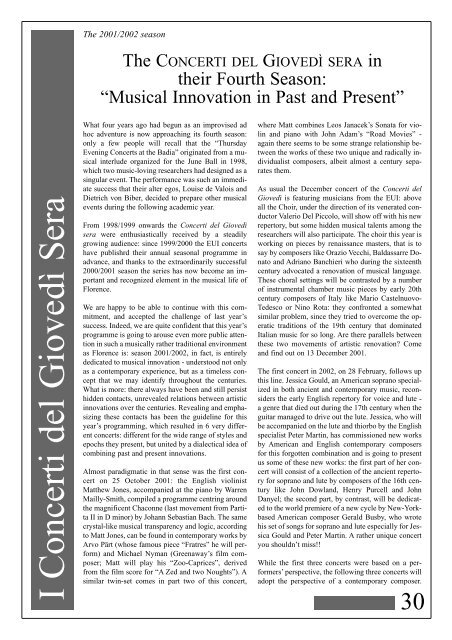History - European University Institute
History - European University Institute
History - European University Institute
Create successful ePaper yourself
Turn your PDF publications into a flip-book with our unique Google optimized e-Paper software.
I Concerti del Giovedì Sera<br />
The 2001/2002 season<br />
The CONCERTI DEL GIOVEDÌ SERA in<br />
their Fourth Season:<br />
“Musical Innovation in Past and Present”<br />
What four years ago had begun as an improvised ad<br />
hoc adventure is now approaching its fourth season:<br />
only a few people will recall that the “Thursday<br />
Evening Concerts at the Badia” originated from a musical<br />
interlude organized for the June Ball in 1998,<br />
which two music-loving researchers had designed as a<br />
singular event. The performance was such an immediate<br />
success that their alter egos, Louise de Valois and<br />
Dietrich von Biber, decided to prepare other musical<br />
events during the following academic year.<br />
From 1998/1999 onwards the Concerti del Giovedì<br />
sera were enthusiastically received by a steadily<br />
growing audience: since 1999/2000 the EUI concerts<br />
have publishrd their annual seasonal programme in<br />
advance, and thanks to the extraordinarily successful<br />
2000/2001 season the series has now become an important<br />
and recognized element in the musical life of<br />
Florence.<br />
We are happy to be able to continue with this commitment,<br />
and accepted the challenge of last year’s<br />
success. Indeed, we are quite confident that this year’s<br />
programme is going to arouse even more public attention<br />
in such a musically rather traditional environment<br />
as Florence is: season 2001/2002, in fact, is entirely<br />
dedicated to musical innovation - understood not only<br />
as a contemporary experience, but as a timeless concept<br />
that we may identify throughout the centuries.<br />
What is more: there always have been and still persist<br />
hidden contacts, unrevealed relations between artistic<br />
innovations over the centuries. Revealing and emphasizing<br />
these contacts has been the guideline for this<br />
year’s programming, which resulted in 6 very different<br />
concerts: different for the wide range of styles and<br />
epochs they present, but united by a dialectical idea of<br />
combining past and present innovations.<br />
Almost paradigmatic in that sense was the first concert<br />
on 25 October 2001: the English violinist<br />
Matthew Jones, accompanied at the piano by Warren<br />
Mailly-Smith, compiled a programme centring around<br />
the magnificent Chaconne (last movement from Partita<br />
II in D minor) by Johann Sebastian Bach. The same<br />
crystal-like musical transparency and logic, according<br />
to Matt Jones, can be found in contemporary works by<br />
Arvo Pärt (whose famous piece “Fratres” he will perform)<br />
and Michael Nyman (Greenaway’s film composer;<br />
Matt will play his “Zoo-Caprices”, derived<br />
from the film score for “A Zed and two Noughts”). A<br />
similar twin-set comes in part two of this concert,<br />
where Matt combines Leos Janacek’s Sonata for violin<br />
and piano with John Adam’s “Road Movies” -<br />
again there seems to be some strange relationship between<br />
the works of these two unique and radically individualist<br />
composers, albeit almost a century separates<br />
them.<br />
As usual the December concert of the Concerti del<br />
Giovedì is featuring musicians from the EUI: above<br />
all the Choir, under the direction of its venerated conductor<br />
Valerio Del Piccolo, will show off with his new<br />
repertory, but some hidden musical talents among the<br />
researchers will also participate. The choir this year is<br />
working on pieces by renaissance masters, that is to<br />
say by composers like Orazio Vecchi, Baldassarre Donato<br />
and Adriano Banchieri who during the sixteenth<br />
century advocated a renovation of musical language.<br />
These choral settings will be contrasted by a number<br />
of instrumental chamber music pieces by early 20th<br />
century composers of Italy like Mario Castelnuovo-<br />
Tedesco or Nino Rota: they confronted a somewhat<br />
similar problem, since they tried to overcome the operatic<br />
traditions of the 19th century that dominated<br />
Italian music for so long. Are there parallels between<br />
these two movements of artistic renovation? Come<br />
and find out on 13 December 2001.<br />
The first concert in 2002, on 28 February, follows up<br />
this line. Jessica Gould, an American soprano specialized<br />
in both ancient and contemporary music, reconsiders<br />
the early English repertory for voice and lute -<br />
a genre that died out during the 17th century when the<br />
guitar managed to drive out the lute. Jessica, who will<br />
be accompanied on the lute and thiorbo by the English<br />
specialist Peter Martin, has commissioned new works<br />
by American and English contemporary composers<br />
for this forgotten combination and is going to present<br />
us some of these new works: the first part of her concert<br />
will consist of a collection of the ancient repertory<br />
for soprano and lute by composers of the 16th century<br />
like John Dowland, Henry Purcell and John<br />
Danyel; the second part, by contrast, will be dedicated<br />
to the world premiere of a new cycle by New-Yorkbased<br />
American composer Gerald Busby, who wrote<br />
his set of songs for soprano and lute especially for Jessica<br />
Gould and Peter Martin. A rather unique concert<br />
you shouldn’t miss!!<br />
While the first three concerts were based on a performers’<br />
perspective, the following three concerts will<br />
adopt the perspective of a contemporary composer.<br />
30

















